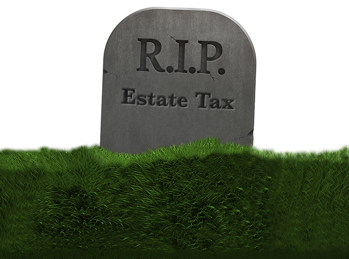Raise the Estate Tax. Please.
The tax on property—cash, real estate, stock, or other assets transferred from deceased persons to their heirs—should be raised. A lot.

Mr. Trump is about to propose tax relief... for himself and other rich people. Including the elimination of the estate tax—which the rich like to call the “death tax.” That plan is just wrong. Here’s why.
-
-
- Passing on huge amounts of untaxed wealth from generation to generation is inconsistent with long-held American values. Bootstraps, anybody? Americans are supposed to make it on their own efforts (we’re supposed to be a “meritocracy”), not slide by on the sweat of dead people.
- Large concentrations of wealth are inimical to democracy. We need to limit the ability of the wealthy to buy our democracy and privatize the Commons—and those who take their money abroad in an effort to avoid paying US taxes should lose their US citizenship.
- Americans have a moral obligation to pay forward a return to invest in the success of current and future generations. Think of it as a “thank-you” to the system from which they benefitted. It is simply un-American to climb the ladder to success, then pull up the ladder after you.
- Investing the wealth of deceased Americans will assure that new wealth can be created. And innovation. This is one reason why the US doesn’t innovate anymore.
- When estate taxes are high, there is an incentive to invest in productive things and businesses, thereby benefiting both the investor and the society. As the saying goes, “Money is like fertilizer…”
- The top 1% will never miss it. Only a tiny fraction of the wealthy will pay any estate tax under current law; those who have to pay will do so on only a fraction of their residual wealth.
- The USA will need the money. Those who benefit most from the current system, which is rigged in favor of vast concentrations of wealth, should feel not just an obligation to pay more, but a desperate need to pay more—because there will be increasing numbers of economic crashes (capitalism is naturally unstable) and increasingly disastrous weather events (because of anthropogenic climate destruction). Call it a “rainy day fund” if you like (or a hurricane fund!)—but the poor and (vanishing) middle class are already squeezed to the limit.
- Inherited wealth serves to “feudalize” society. Those who believe that talent and hard work will provide a good life will be left behind those whose wealth gives them more than they can ever get through earnings alone: when someone doesn’t do much to earn what they have, they don’t appreciate it very much.
- Transfers of accumulated wealth from generation to generation create not just an increasingly unequal society—already an un-American idea—but an unstable society, as well. The idle rich will put policies into place that are more favorable to those inheriting their money, rather than the low-income workers who earn it. Massive wealth inequality creates political unrest.
- Most of the fortunes in the USA (and elsewhere in the world) were created from stolen money. That is, the wealthy elite became that way because they opportunistically exploited resources and undercompensated the labor of their workers. Gifting this stolen wealth on future generations, without heavily taxing it, will only encourage resource and wage theft in the future.
Remember the saying, “Unearned money buys nothing but trouble”? So, who wouldn't want to spend money they didn’t earn? Well, me, for one.
-

